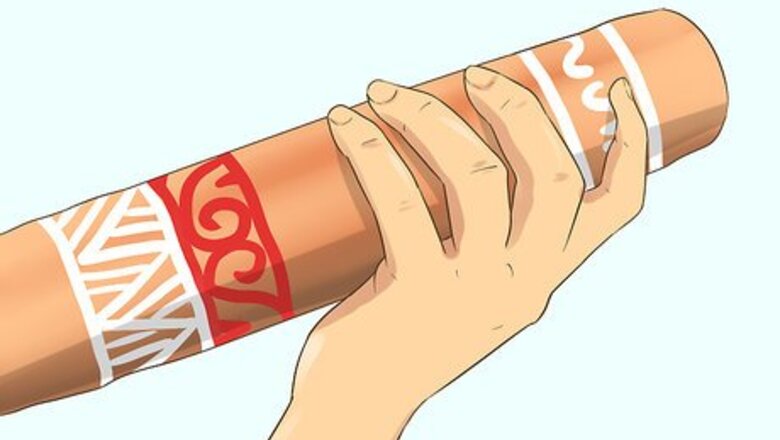
views
Creating the Right Environment
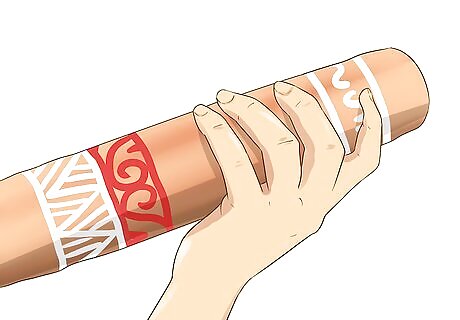
Get access to a didgeridoo. Many players begin with a plastic didj. They are relatively inexpensive and you can find one online to purchase very easily. Others prefer to go directly to a wood didj. Even then you will want to consider your budget and the type of wood that you would like, such as agave. Wood didgeridoos are less likely to break and create a deeper, richer sound when played. Some music stores rent didgeridoos and, if you take a class, you may be able to borrow one during the sessions. Be aware, however, that most serious didj players recommend purchasing a personal instrument to make regular practicing easier.
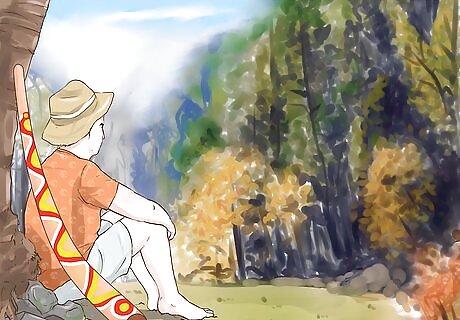
Find a peaceful location. It is best to play and practice in an area where you will not be disturbed. This is especially important if you are practicing breathing techniques. You also need to be able to hear yourself play. This sounds easier than it is. The vibrations from the didj will muffle your hearing making it more difficult to identify particular notes or sounds. Some say that the bathroom is the ideal place to play the didgeridoo due to the amplified acoustics. The tile etc. helps to magnify the sound.

Choose a playing position. You can stand or sit in a chair or on the ground. Most people prefer the sitting position as it is easier to maintain for long periods of time. If you are sitting on the ground you can rest your didj on the top of your bare foot. Try to avoid resting your didj directly on the ground. This helps to keep the sound clear and undistorted. In all positions, make sure to maintain proper posture. Keep your back straight and your shoulder back. Slumping over can hurt your ability to move air effectively up from your lungs into your instrument.
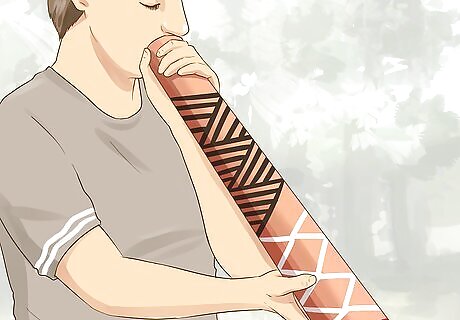
Establish your hand grip. No matter which position you choose, your grip remains the same. Cradle the didgeridoo in the upturned palm of your dominant hand. Your index finger should be pointing away from you, leaving your thumb and remaining fingers to curl around the didj. Slide this hand down until it is a relaxed arm’s reach out. The other hand can be used to balance the didj close to the mouthpiece if needed.

Adopt a calm mindset. Playing the didgeridoo is often compared with meditation or spiritual experiences. Keeping your mind clear and focusing on playing the didj will allow you to reap all of the possible mental benefits. Tell yourself, “Be calm,” before sitting down and playing. And, if other thoughts intrude, put down your didj until you can re-focus. It might help to say, "This is my time to play," aloud if you feel distracted. You can also ask your fellow players to keep you on task by having them alert you if you seem unfocused. You can also lower the lights a bit and maybe light some candles or incense to create a calming environment for playing your didj.
Learning the Fundamentals

Develop and practice your base drone apart from your didj. The base drone is the foundation upon which all didj sounds are built. You will keep droning, even as you add other sounds to the mix. Relax your lips and blow through them causing them to vibrate. Some would liken this to “giving a raspberry” or imitating a horse blowing air out of its mouth. This will be similar to, but not exactly, like a brass musician preparing to play. Your lips will need to be a bit looser than a trumpet players. It may be helpful to practice in front of a mirror.
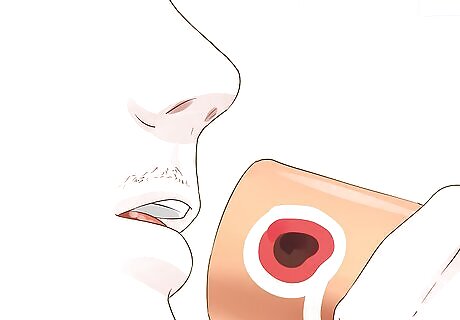
Place your lips on the didj. When you feel like you can hold your drone for 20 seconds or so, go ahead and put your mouth against the opening of your didgeridoo. Your lips should lay firmly, but not inflexible, against the mouthpiece. They’ll need to move without letting any air out. You don’t have to directly align your lips with the mouthpiece. Some people prefer to play from the side of their mouth. You can add beeswax to your mouthpiece to make it softer and to create a better seal. Warm up the wax until it is malleable, add it to the rim, and adjust to create an opening hole. Keep in mind that the larger the hole, the more air that is required to play. Most people learning using a 3cm diameter center hole. You can continue to adjust the wax as you play.
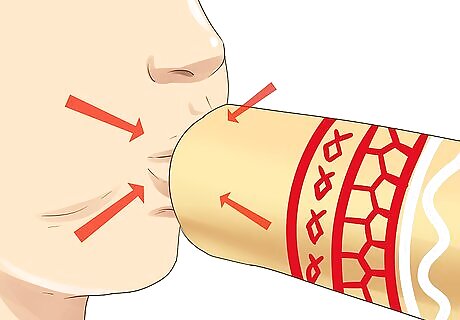
Tighten or loosen your lips. Once you begin your drone, you can alter the sound by consciously altering the tension in your lips. The sound will also give you feedback. For example, if your lips are too tight then the didj will emit a higher, trumpeting sound. Drop your jaw and move away from a smile to hear a more soothing tone in a lower register.
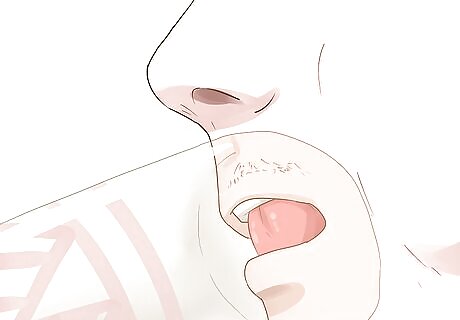
Engage your tongue and cheeks. Tap your tongue on your teeth. Quickly push your tongue against the roof of your mouth. Roll your tongue as if you are trying to say an extended “r” in Spanish. Wave your tongue from side to side in your mouth. Allow your cheeks to puff out a bit with extra air. Alternate cheeks for additional sound changes. Be careful to continue your base drone as you make these adjustments. Make all of these movements quickly and methodically. If you linger too long on any one movement, you could possibly kill off your drone by stopping the air flow. Puffing out your cheeks will result in a more even sound whereas tightening them with sharpen it.

Involve your diaphragm. The diaphragm is a muscle that helps to push air in and out of your lungs. The diaphragm is powerful and can create short bursts of air that will, in turn, create a pulsing sound in your didj. To do this try making a “ha…ha…ha” or laughing noise without using your actual voice. You can do this softly or forcefully.

Experiment with unique vocalizations. Keep a steady drone and then get creative with your tones and sounds. Form your mouth as if you were about to say a letter, such as “A,” then keep the drone going and see how that changes the harmonics. Try repeating various vowels combos, like “AOE.” This will require that you carefully monitor your breathing. It is also quite common to make animal sounds on the didj. Try a bark for dingo. Or, maybe a more complex “Kuku” noise for the Kukubarra.
Mastering Circular Breathing
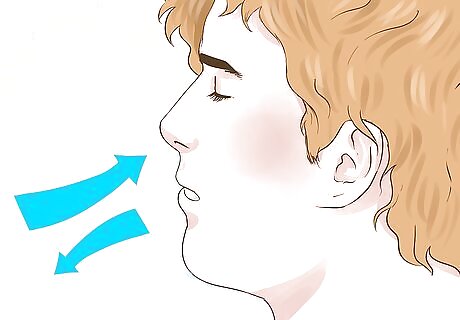
Pay attention to your current breathing patterns. Sit down and take a handful of deep breaths. Focus in on how the air flows through your body and how you exhale. Do you naturally inhale with your mouth? Do you automatically exhale through your nose? As you head toward a nose-centered breathing technique this will help you to identify your strengths and weaknesses.
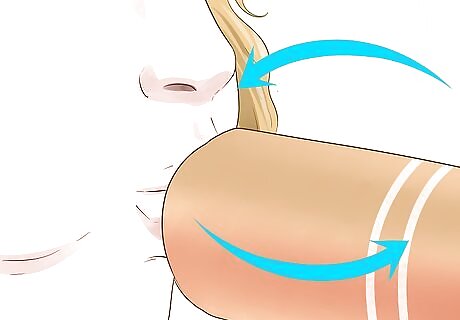
Understand the mechanics of circular breathing. The goal is to maintain a continual, uninterrupted air supply while playing the didgeridoo. You will pull air in with your nose while simultaneously pushing air out through your mouth into the didj mouthpiece. You will also continue to drone throughout this process. With circular breathing you consider the air that you breath in and the air in your mouth as two different entities. They should both feel as if they are never empty and consistently in motion. Establishing a rhythm is important here. One of the keys is to resist blowing the air out of your mouth. That will empty your lungs and stop the drone. Instead, slowly push the air out of your mouth mimicking the same motion as you would when spitting out water.

Practice circular breathing with water. Before you are ready to hit the didj, you need to practice. Get a straw and a glass of water. Place the straw in the water and put your lips the tip of the straw. Inhale through your nose while blowing bubbles in the water. Try to keep the bubbles constant as they represent the constancy of your drone. Repeat this multiple times a day until it becomes easy. Another way to practice is to drink and hold water in your mouth until your cheeks puff out. Then, slowly spit the water out of your mouth. Inhale through your nose as you do this. Your tongue should keep you from gagging or swallowing the water. It is easy to practice this one in the shower.
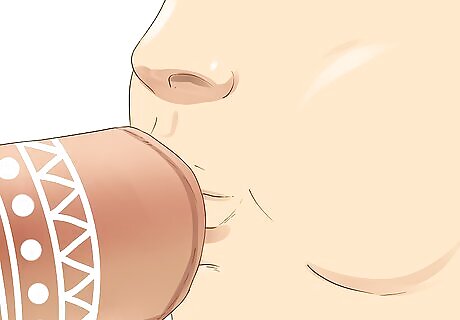
Practice circular breathing with inflated cheeks. Without the didj, simulate your breathing movements. Breath in until your cheeks are full. Keep inhaling through your nose as you push the air out of your mouth. Be controlled in these movements.
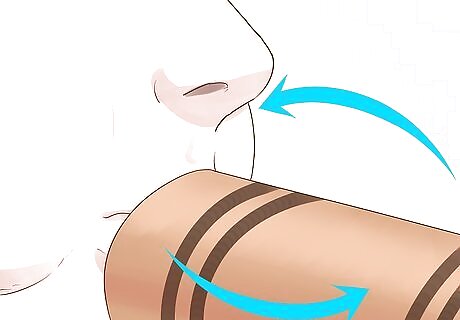
Find your breathing rhythm with the didj. Apply your circular breathing techniques when playing the didgeridoo. Keep up the inhale/push out rhythm while maintaining your drone. Avoid incorporating any extra sounds until you have a good handle on the breathing. If your breath is holding steady, the didj will sound steady and full of air as well. You should not expect to master circular breathing right away. It is generally one of the more frustrating parts of learning to play the didgeridoo. Keep working on your breathing but recognize that you can still play the didj without holding long notes.

Enhance your lung capacity. Inhale in a controlled manner until your lungs feel full. Hold this air in for one second before exhaling slowing until your lungs feel totally drained. Pause for a second and repeat. Do this exercise for 10-15 minutes every day and you will see results. You can also improve your lung capacity by avoiding smoking and regularly exercising.
Refining Your Playing Skills

Keep practicing. As it is with any instrument, practice is key when learning the didj. Play as often as you can. Challenge yourself with new sounds and holding positions. Gather up an audience and play for them and get feedback. Once you gain the confidence even an open-mic night becomes a possibility.
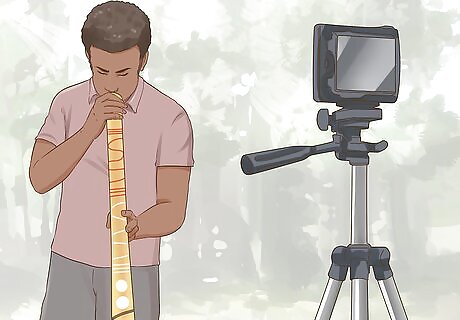
Record yourself. If you are not comfortable playing for others face-to-face, you can record your sounds and place them online at a didj forum. Find a forum such as this by entering “didgeridoo forum” into a search engine. If you post a clip you could receive feedback from other players. Or, you could record your playing simply for yourself as a way to self-critique.
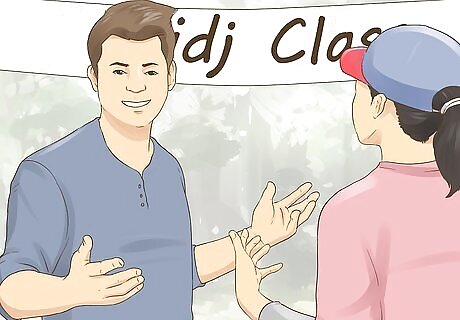
Take a class. To receive more in-depth instruction, enroll in an online class or take a course at your local college, if offered. Some of these classes are offered by musicians for free and others require a fee so investigate before signing up. These classes often incorporate the history of the didj as well, which can add another layer to your experience.



















Comments
0 comment